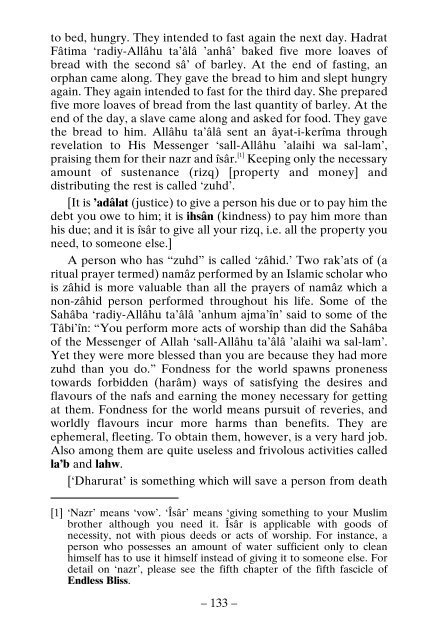Ethics of Islam
Ethics of Islam is taken from the book Berîka by Muhammad Hâdimi. Immorality and ways to get rid of it; 40 depravities and cures to them; usefulness of ethics; what is a soul; strengths of a soul; Personalities emanating from wisdom, courage, chastity and justice are extensively explained.
Ethics of Islam is taken from the book Berîka by Muhammad Hâdimi. Immorality and ways to get rid of it; 40 depravities and cures to them; usefulness of ethics; what is a soul; strengths of a soul; Personalities emanating from wisdom, courage, chastity and justice are extensively explained.
You also want an ePaper? Increase the reach of your titles
YUMPU automatically turns print PDFs into web optimized ePapers that Google loves.
to bed, hungry. They intended to fast again the next day. Hadrat<br />
Fâtima ‘radiy-Allâhu ta’âlâ ’anhâ’ baked five more loaves <strong>of</strong><br />
bread with the second sâ’ <strong>of</strong> barley. At the end <strong>of</strong> fasting, an<br />
orphan came along. They gave the bread to him and slept hungry<br />
again. They again intended to fast for the third day. She prepared<br />
five more loaves <strong>of</strong> bread from the last quantity <strong>of</strong> barley. At the<br />
end <strong>of</strong> the day, a slave came along and asked for food. They gave<br />
the bread to him. Allâhu ta’âlâ sent an âyat-i-kerîma through<br />
revelation to His Messenger ‘sall-Allâhu ’alaihi wa sal-lam’,<br />
praising them for their nazr and îsâr. [1] Keeping only the necessary<br />
amount <strong>of</strong> sustenance (rizq) [property and money] and<br />
distributing the rest is called ‘zuhd’.<br />
[It is ’adâlat (justice) to give a person his due or to pay him the<br />
debt you owe to him; it is ihsân (kindness) to pay him more than<br />
his due; and it is îsâr to give all your rizq, i.e. all the property you<br />
need, to someone else.]<br />
A person who has “zuhd” is called ‘zâhid.’ Two rak’ats <strong>of</strong> (a<br />
ritual prayer termed) namâz performed by an <strong>Islam</strong>ic scholar who<br />
is zâhid is more valuable than all the prayers <strong>of</strong> namâz which a<br />
non-zâhid person performed throughout his life. Some <strong>of</strong> the<br />
Sahâba ‘radiy-Allâhu ta’âlâ ’anhum ajma’în’ said to some <strong>of</strong> the<br />
Tâbi’în: “You perform more acts <strong>of</strong> worship than did the Sahâba<br />
<strong>of</strong> the Messenger <strong>of</strong> Allah ‘sall-Allâhu ta’âlâ ’alaihi wa sal-lam’.<br />
Yet they were more blessed than you are because they had more<br />
zuhd than you do.” Fondness for the world spawns proneness<br />
towards forbidden (harâm) ways <strong>of</strong> satisfying the desires and<br />
flavours <strong>of</strong> the nafs and earning the money necessary for getting<br />
at them. Fondness for the world means pursuit <strong>of</strong> reveries, and<br />
worldly flavours incur more harms than benefits. They are<br />
ephemeral, fleeting. To obtain them, however, is a very hard job.<br />
Also among them are quite useless and frivolous activities called<br />
la’b and lahw.<br />
[‘Dharurat’ is something which will save a person from death<br />
[1] ‘Nazr’ means ‘vow’. ‘Îsâr’ means ‘giving something to your Muslim<br />
brother although you need it. Îsâr is applicable with goods <strong>of</strong><br />
necessity, not with pious deeds or acts <strong>of</strong> worship. For instance, a<br />
person who possesses an amount <strong>of</strong> water sufficient only to clean<br />
himself has to use it himself instead <strong>of</strong> giving it to someone else. For<br />
detail on ‘nazr’, please see the fifth chapter <strong>of</strong> the fifth fascicle <strong>of</strong><br />
Endless Bliss.<br />
– 133 –

















